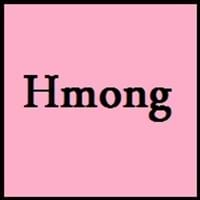Filipino vs Hmong
Countries
Philippines
China, Laos, Thailand, United States of America, Vietnam
National Language
Philippines
China, Gambia, Laos, Thailand, United States of America, Vietnam
Second Language
Philippines
Not spoken in any of the countries, Republic of Brazil
Speaking Continents
Asia
Asia
Minority Language
Not spoken in any of the countries
Not spoken in any of the countries
Regulated By
Komisyon sa Wikang Filipino
Not Available
Interesting Facts
- "Filipino" was officially declared as national language by the constitution in 1987.
- "Filipino" is the official name of Tagalog, or synonym of it.
- Hmong language may not be so popular at first sight, but it has rich history and various dialects are spoken by millions of people.
- Hmong language came from western part of China.
Similar To
Tagalog Language
Not Available
Derived From
Spanish Language
Not Available
Alphabets in
Filipino-Alphabets.jpg#200
Hmong-Alphabets.jpg#200
Writing Direction
Not Available
Left-To-Right, Horizontal
Hello
Kumusta
Nyob zoo (Nyaw zhong)
Thank You
Salamat
Ua tsaug (Oua jow)
How Are You?
Kumusta
Koj nyob li cas (Gaw nyaw lee cha)
Good Night
magandang gabi
zoo hmo
Good Evening
Magandang gabi
zoo yav tsaus ntuj
Good Afternoon
Magandang hapon
zoo tav su
Good Morning
Magandang umaga
zoo thaum sawv ntxov
Sorry
pinagsisisihan
Thov txim (Thaw zhee)
I Love You
Mahal kita
Kuv hlub koj
Excuse Me
patawarin ninyo ako
zam txim rau kuv
Dialect 1
Bikol
Hmong Njua
Where They Speak
Philippines
Laos
How Many People Speak
Not Available
Dialect 2
Hiligaynon
Hmong Daw
Where They Speak
Philippines
China
Where They Speak
Philippines
Vietnam
How Many People Speak
Not Available
Speaking Population
Not Available
Second Language Speakers
Not Available
Native Name
filipino
Hmong
Alternative Names
Pilipino
Mong
French Name
filipino; pilipino
hmong
German Name
Pilipino
Miao-Sprachen
Pronunciation
[ˌfɪl.ɪˈpiː.no]
Not Available
Ethnicity
Not Available
Hmong people
Language Family
Austronesian Family
Hmong–Mien Family
Subgroup
Not Available
Not Available
Branch
Not Available
Not Available
Early Forms
No early forms
No early forms
Standard Forms
Filipino
Hmong
Signed Forms
Not Available
Not Available
Scope
Individual
Macrolanguage
ISO 639 1
No Data Available
No data available
ISO 639 2/T
fil
Not Available
ISO 639 2/B
fil
Not Available
ISO 639 6
Not Available
Not Available
Glottocode
fili1244
firs1234
Linguasphere
No Data Available
No data available
Language Type
Living
Living
Language Linguistic Typology
Not Available
Not Available
Language Morphological Typology
Not Available
Not Available
Filipino and Hmong Language History
Comparison of Filipino vs Hmong language history gives us differences between origin of Filipino and Hmong language. History of Filipino language states that this language originated in 16th Century whereas history of Hmong language states that this language originated in 19. Family of the language also forms a part of history of that language. More on language families of these languages can be found out on Filipino and Hmong Language History.
Filipino and Hmong Greetings
People around the world use different languages to interact with each other. Even if we cannot communicate fluently in any language, it will always be beneficial to know about some of the common greetings or phrases from that language. This is where Filipino and Hmong greetings helps you to understand basic phrases in Filipino and Hmong language. Filipino word for "Hello" is Kumusta or Hmong word for "Thank You" is Ua tsaug (Oua jow). Find more of such common Filipino Greetings and Hmong Greetings. These greetings will help you to be more confident when conversing with natives that speak these languages.
Filipino vs Hmong Difficulty
The Filipino vs Hmong difficulty level basically depends on the number of Filipino Alphabets and Hmong Alphabets. Also the number of vowels and consonants in the language plays an important role in deciding the difficulty level of that language. The important points to be considered when we compare Filipino and Hmong are the origin, speaking countries, language family, different greetings, speaking population of these languages. Want to know in Filipino and Hmong, which language is harder to learn? Time required to learn Filipino is 44 weeks while to learn Hmong time required is 44 weeks.





